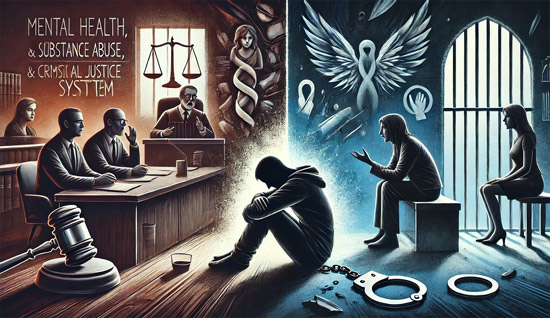As a criminal defense attorney, I have seen firsthand how mental health issues and substance abuse often intertwine to create a perfect storm that leads individuals into the criminal justice system. These cases are some of the most challenging but also some of the most important to handle with care and compassion. Understanding the connection between mental health, substance abuse, and criminal behavior is critical not only for defending clients effectively but also for advocating for systemic changes that address the root causes of these issues.
The Connection Between Mental Health and Substance Abuse
Mental health challenges, ranging from anxiety and depression to more severe conditions like bipolar disorder or schizophrenia, can profoundly affect an individual’s decision-making and coping mechanisms. Unfortunately, many individuals struggling with these issues lack access to appropriate treatment or support. This gap often leaves them searching for relief in unhealthy ways, including substance abuse.
Substances such as alcohol, opioids, and stimulants may provide temporary respite from overwhelming emotions or intrusive thoughts, but they often exacerbate the underlying mental health conditions. What starts as self-medication can quickly spiral into addiction, further destabilizing an individual’s life and increasing the likelihood of encounters with law enforcement.
Increased Risk of Criminal Charges
When mental health and substance abuse collide, the result is often a cascade of legal troubles. Many individuals in this situation find themselves facing common criminal charges, including:
- Public Intoxication or Disorderly Conduct: Impaired judgment or erratic behavior linked to substance use or untreated mental health episodes can lead to arrests in public settings.
- Theft or Shoplifting: Desperate to fund their addiction or caught in the fog of impaired reasoning, individuals may resort to stealing, often unaware of the consequences.
- Drug Possession: Addiction to illicit substances frequently results in possession charges, creating a vicious cycle of legal troubles that rarely address the root problem.
- DUI/DWI: Substance use to cope with mental health struggles can lead to driving under the influence, endangering not only the individual but others on the road.
- Assault or Domestic Disputes: Mental health crises or substance-induced aggression can lead to altercations, resulting in criminal charges.
- Many More: The issues that arise aren’t simply targeting a few areas. The legal areas that become a problem are vast based on each individual circumstance. These mental health challenges aren’t simply based to a few categories they vary widely in scope and variety.
The Criminal Justice System’s Challenges
The criminal justice system is not well-equipped to address the complexities of cases involving mental health and substance abuse. Many individuals end up in jail instead of receiving the treatment they need. This not only fails to address the root causes of their behavior but often worsens their mental health and addiction issues due to the lack of appropriate resources within the system.
For instance, incarceration can heighten feelings of isolation, anxiety, and depression, and access to effective mental health or substance abuse treatment is limited in many facilities. This perpetuates a cycle of recidivism, where individuals are released only to face the same struggles and find themselves back in the criminal justice system.
Advocacy and Defense for Clients
As a defense attorney, I view my role as more than just defending against the charges. It’s about advocating for solutions that address the bigger picture. Many of my clients benefit from alternatives to traditional sentencing, such as mental health diversion programs, drug courts, or probation terms that include mandatory treatment.
These programs can provide the structured environment and support needed for individuals to address the underlying issues driving their criminal behavior. By presenting evidence of a client’s mental health struggles or addiction, I can often work to secure these alternatives instead of punitive measures that do little to help my clients move forward.
Toward a More Compassionate System
The intersection of mental health, substance abuse, and criminal behavior is a societal issue, not just a legal one. As a community, we must invest in better mental health care, accessible addiction treatment, and education to prevent individuals from falling through the cracks in the first place. This requires collaboration between lawmakers, healthcare providers, and the criminal justice system to create solutions that are proactive rather than reactive.
Conclusion
Mental health and substance abuse are not excuses for criminal behavior, but they are critical factors that must be considered in any fair and just legal process. For those facing charges while struggling with these challenges, the legal system should be a pathway to recovery and rehabilitation, not just punishment.
If you or a loved one is facing criminal charges tied to mental health or substance abuse, it’s essential to work with an attorney who understands these complexities and will fight to ensure that the whole story is told. At the Tuomey Law Firm, we are committed to providing compassionate and effective defense while advocating for solutions that pave the way for lasting change.


